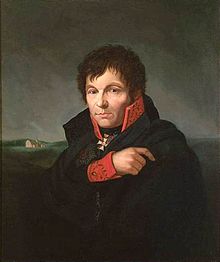Gerhard von Scharnhorst
| Gerhard Johann David von Scharnhorst | |
|---|---|

Gerhard von Scharnhorst
|
|
| Born |
12 November 1755 Bordenau, near Hanover, Electorate of Hanover,(Personal Union with Great Britain) |
| Died | 28 June 1813 (aged 57) Prague |
| Buried at | Invalidenfriedhof, Berlin |
| Allegiance |
|
| Service/branch | Prussian Army |
| Years of service | 1778–1813 |
| Rank | Lieutenant-General |
| Battles/wars | Napoleonic Wars |
| Awards | Pour le Mérite (Military class) |
Gerhard Johann David Waitz von Scharnhorst (12 November 1755 – 28 June 1813), was a Hanoverian-born general in Prussian service from 1801. As the first Chief of the Prussian General Staff, he was noted for his military theories, his reforms of the Prussian army, and his leadership during the Napoleonic Wars. Scharnhorst limited the use of corporal punishments, established promotion for merit, abolished the enrollment of foreigners, began the organization of a reserve army, and organized and simplified the military administration.
Born at Bordenau (now a part of Neustadt am Rübenberge, Lower Saxony) near Hanover, into a farmer's family, Waitz von Scharnhorst succeeded in educating himself and in securing admission to the military academy of William, Count of Schaumburg-Lippe, at the Wilhelmstein fortress. In 1778 he received a commission into the Hanoverian service. He employed the intervals of regimental duty in further self-education and literary work. In 1783 he transferred to the artillery and received an appointment to the new artillery school in Hanover. He had already founded a military journal which, under a series of names, endured until 1805, and in 1788 he designed, and in part published, a Handbook for Officers in the Applied Sections of Military Science (Handbuch für Offiziere in den anwendbaren Teilen der Kriegswissenschaften). He also published in 1792 his Military Handbook for Use in the Field (Militärisches Taschenbuch für den Gebrauch im Felde).
The income he derived from his writings provided Scharnhorst's chief means of support, for he still held the rank of lieutenant, and though the farm of Bordenau produced a small sum annually, he had a wife, Clara Schmalz (a sister of Theodor Schmalz, the first director of Berlin University) and family to maintain. His first military campaign took place in 1793 in the Netherlands, in which he served with distinction under the Duke of York. In 1794 he took part in the defence of Menen and commemorated the escape of the garrison in his Defence of the Town of Menen (Verteidigung der Stadt Menin, Hanover, 1803), which, apart from his paper on "The Origins of the Good Fortune of the French in the Revolutionary War" (Die Ursachen des Glücks der Franzosen im Revolutionskrieg) remains his best-known work. Shortly thereafter he received promotion to the rank of major and joined the staff of the Hanoverian contingent.
...
Wikipedia
